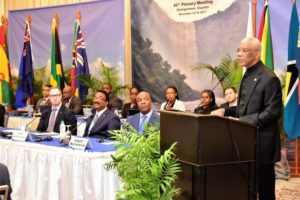President David Granger, who attended the opening ceremony of the Caribbean Financial Action Task Force (CFATF) 46th Plenary Meeting at the Marriott Hotel Guyana on Wednesday, spoke of the country’s readiness to fight money laundering and the financing of terrorism.

In his address to the dignitaries gathered the President said, among other things, that the Caribbean is currently fighting a war against “financial privateers to preserve the integrity of its institutions and to counter money-laundering and the financing of terrorism.”
The Caribbean, according to President Granger, has become a paradise for ” for money-launderers, tax-evaders and assorted transnational criminal cartels” whose crimes he noted have the potential of ” disrupting our economies, corrupting officials, subverting our institutions, perverting our youth and spawning frightening levels of crime and violence in society.”
Turning his attention to Guyana, the Head of State quipped that the country is “fit to fight”, highlighting that Guyana, some seventeen years ago, has embarked on the path of passing robust regulations and legislation to protect its financial system from financing unlawful activities.
Providing examples, the President posited that Guyana passed:
• The Money-Laundering (Prevention) Act 2000;
• The Anti-Money Laundering and the Countering of the Financing of Terrorism Act 2009;
• The Anti-Money Laundering and the Countering the Financing of Terrorism (Amendment) Act 2010;
• The Anti-Money Laundering and the Countering the Financing of Terrorism (Amendment) Act 2015; and
• The Anti-Money Laundering and the Countering the Financing of Terrorism (Amendment) (No. 2) Act 2015.
This legislation, progressively, has corrected deficiencies in the AML-CFT regime and allowed for the improvement of compliance with the Task Force’s standards he said.
According to President Granger, the appropriate agencies – the Bank of Guyana, the Financial Intelligence Unit (FIU) and the Office of the Director of Public Prosecutions (DPP) – have been “empowered with the authority and autonomy and equipped with the technical and institutional means to discharge their functions under our anti-money laundering and the countering of the financing of terrorism legislation.”
The President in his address remarked that the Task Force’s recommendations are necessary and can help to insulate the Region’s economies from contamination from “dirty money and by protecting the integrity of our financial sector from the risks associated with ill-gotten gains.”
Moreover, he said that The Task Force’s recommendations will help, also, to cultivate a “stable financial sector that will allow for the facilitation of international trade and investment and enhance the interconnectedness between the Region’s financial sector and the global banking system in order to prevent our banks from being blacklisted.”
Chairperson of the Caribbean Financial Action Task Force (CFATF) Rhondalee Braithwaite-Knowles had said that Guyana has done a “miraculous job” at strengthening its Anti-Money Laundering and Countering the Financing of Terrorism (AML/CFT) regime.
Executive Director of the regional body, Calvin Wilson who also applauded Guyana’s efforts, said that the important starting point is that the country, in a short time was able to pass a suite of legislation, which resulted in Guyana’s removal from the Financial Action Task Force’s (FATF) blacklist.
In terms of Guyana’s 2022 Mutual Evaluation process, the CFATF Executive advised that Guyana takes preparatory steps, one of which would be the conduct of a national risk assessment, which is completed, followed by the development of a national action plan. “If there is more work to be done in terms of coming into compliance legislatively with the 40 recommendations, you make those changes now,” he emphasised.
Further, Wilson noted that the data should be collated, since the Fourth Round of Mutual Evaluation is based on effectiveness, requiring the availability of data that validates the efficiency of the country’s AML/CFT regime. This, he said is a challenge in not only the region but around the world.
“Guyana needs to pay particular attention to their data capturing mechanisms and also educating all stakeholders …both public and private…coordinating closely, nationally to ensure that the internal mechanism in terms of strengthening the AML/CFT architecture, is strong,” he noted.



